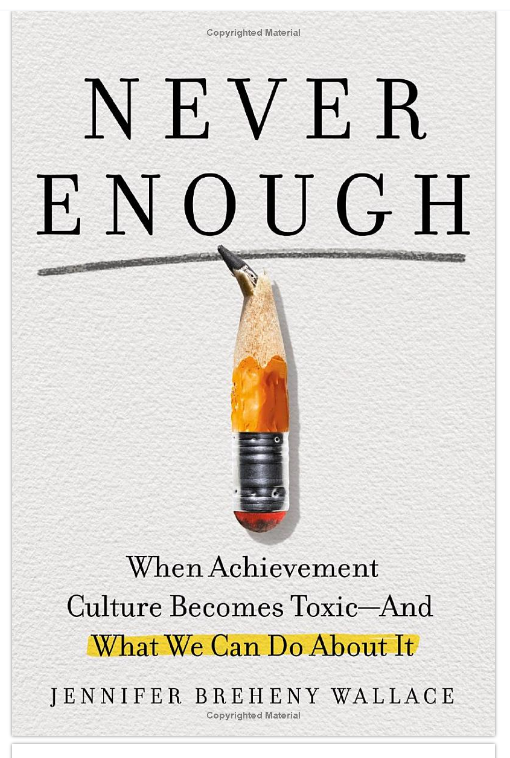






Kids Need to Feel That They Matter
Jennifer Breheny Wallace is a journalist, mom, long-time friend of Let Grow, and now the author of a book coming out today, “Never Enough: When Achievement Culture Becomes Toxic — And What We Can Do About It.”
It’s an absorbing look at the pressure overtaking kids’ and parents’ lives, and a new framework for fighting back. Let Grow President Lenore Skenazy has been friends with Jennifer ever since Jennifer asked her to come over and help her loosen the parenting reins. It worked and Jennifer never looked back! We are thrilled for Jennifer and her groundbreaking book!
LET GROW: What made you decide to write a book on achievement pressure?
JENNIFER BREHENY WALLACE: For years I have been trying to figure out why my children’s childhood was so different from my own, growing up in the 1970s and ’80s. When the Varsity Blues Scandal hit, I wondered: What had changed so much that parents were willing to go to jail to secure their kids a spot at USC? I wasn’t buying the narrative that parents just wanted a bumper sticker. There was something deeper going on.
LG: What did you find out? Why has achievement pressure reached such a fevered pitch?
JBW: I interviewed sociologists, historians, psychologists, economists to answer this very question. There are several reasons, but what resonated most are the macroeconomic forces at play. When I was growing up, life was generally more affordable. Real estate, health care, higher education — even groceries were more affordable. Parents felt reasonably assured that their kids could live a kind of zigzag life and still wind up okay.
Most children back then could replicate their parents’ childhoods and even end up better off financially. But today, nearly two-thirds of Americans no longer believe that’s the case. White middle-class children who were born in 1940 had a 90% chance of out-earning their parents. For children born in the ’80s, their chances of out-earning their parents fell by 50%. Today, Millennials on average have lower earnings and less wealth than past generations did at their age.
LG: What has this macroeconomic shift done to our parenting?
JBW: Whether or not we’re aware, as parents we are absorbing these conditions and becoming, in the words of Tom Curran at the London School of Economics, “social conduits,” preparing kids to survive what we fear is a hypercompetitive future of steep inequality and fewer guaranteed social safety nets.
My parents could focus more on my childhood freedom, play, and happiness, and less on skills-based achievement. But, today’s parents strive to ensure their kids’ futures by weaving what sociologists call “individualized safety nets” for their children. That’s what is at the root of intensive parenting – this idea that we need to protect our children from an uncertain future.
Parents have always been responsible for launching the next generation, but this task has never felt so fraught. Unfortunately, this well-intentioned impulse is hurting too many of the children it’s trying to protect, and directly contributing to the anxiety and depression we are seeing in our youth.
LG: Agreed: Too much adult assistance, intervention, and constant supervision in childhood is driving both generations nuts. What is your solution?
JBW: Well, to start, we need to stop the parent shaming.
LG: Hear hear!
JBW: We also need to put intensive parenting behaviors into a broader context. We need to change the conversation toward a better understanding of how the forces making us unhappy are bigger than any one family, school, or community.
In my reporting, I looked for solutions by focusing on finding “success stories”: Who were the kids who were thriving despite the pressures of our modern achievement culture? What was home life like for them? What was school like? What kind of friendships did they have? What if anything did these healthy achievers have in common?
What these healthy achievers had in common was that they benefited from a high level of “mattering,” of being valued for who they were at their core. Mattering is a psychological construct that’s been studied since the 1980s. It’s the feeling that you are significant and valued by family, friends, and communities. That you are depended on to add meaningful value to family, friends, and community.
In contrast, the kids I met who seemed to be struggling the most felt like their mattering was contingent on their performance. And there was another set of kids who were struggling who felt like yes, they were valued, but they were never depended on to add meaningful value back to anyone other than themselves, via chores or meaningful roles in the wider community. Because of this they lacked social proof that they mattered.
LG: How can parents let kids know they matter, not just for their grades or because we love them?
JBW: I unpack it all in the book.
LG: Of course!
JBW: But, in short, there are actions we can take now in our homes, schools, and wider communities to shore up this sense of mattering in our kids. It requires a shift in what we focus on at home. Because our kids are bombarded with messages day in and day about what society values – the high grades, the “good” college, the big house, fame – our homes need to be a safe place where their worth and mattering is unwavering and never in question.
LG: Yes. And to do that, parents have to make friends with independence. Because independence allows kids to do more things that actually do matter: Take a sibling to school, run an errand, walk the dog — help out in ways that are real.
JBW: Exactly. I look to find ways in our home and in our larger community where my kids can feel they’re making a meaningful impact, like asking them to go over to their grandparents’ house to help with a tech issue, or go grocery shopping for us. We live in New York City, so my kids can walk to the store. Each week, my husband and I take a look at the things in our house that need tending to, and we talk them through as a family. I ask my kids for their help in problem solving family matters – scheduling, etc. – because they’re excellent problem solvers. It makes them feel capable and it alleviates some of my own mental load.
LG: Trusting kids to solve problems and help out is the secret sauce! Is there another ingredient?
JBW: When kids are given freedom to pursue what interests them – versus what society marks as important – it allows them to assert their uniqueness. This reinforces the idea that they matter just for who they are. Freedom also grows their sense of autonomy. They feel capable of making an impact on their world. When we foster this high level of mattering, we offer our children a protective shield against the anxiety and depression that is gripping so many of our young people today.
Jennifer’s “Never Enough,” is out today!




I have a challenging time supporting this book in the frameworks of fostering young people’s agency and highly valuing free-play. Also, reality does not support the assertions that life is a diminishing zero-sum game resulting in a conflict between Status and Scarcity. The premise of the book appears to be that admissions to elite universities creates a toxic education environment for those children aspiring to attend the Ivies, Little Ivies, and Public Ivies and we must do something to ensure positive mental health for our kids. Jennifer Breheny Wallace, however, instead of considering that the problem lies in the elite schools themselves, seems to believe that success in life is wholly dependent on a Harvard sheepskin and we, as upper middle class parents, must modify our support approaches to convince our kids they “matter” in a system that breeds conformity and competitiveness that are irrelevant to not only the way the job world works, but how the vast majority of universities work.
This book does not really support child agency and resilience since its goals can be achieved only through huge doses of adult-directed control.